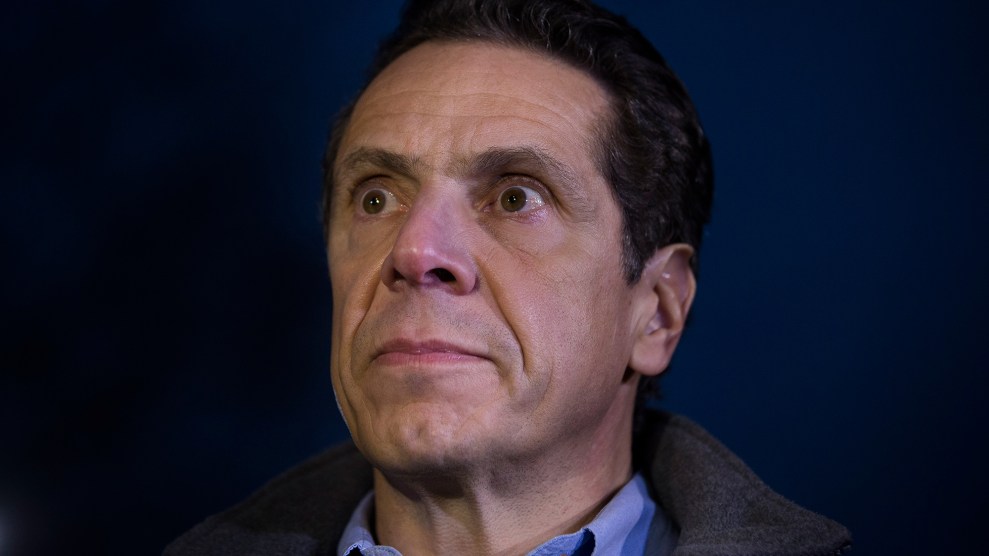
Mary Altaffer/AP
Former New York Gov. Andrew Cuomo’s former right-hand woman, Melissa DeRosa, is out with a new memoir today in which DeRosa, who served as secretary to the governor, doubles down on her former boss’s claims that he never sexually harassed women. That theme comes despite a months-long investigation by the office of the state’s attorney general, Tish James, concluding that yes, he did.
DeRosa, it seems from early glimpses of What’s Left Unsaid: My Life at the Center of Power, Politics & Crisis, still has not found closure when it comes to her former boss’s ignominious exit from Albany and characterizes the allegations that precipitated his downfall as “seemingly frivolous” and “the weaponization of everyday interactions politicians all across America engage in on a daily basis.” Those accusations include allegedly asking a 25-year-old employee whether she ever had ever “been with an older man” and groping an executive assistant in the executive mansion, leading him to be charged with a misdemeanor sex crime before it was eventually dropped. Cuomo has denied each accusation.
But according to excerpts of the memoir making the rounds in the media, DeRosa doesn’t just dismiss the women’s allegations in her new book; she personally belittles them. Of Charlotte Bennett, the 25-year-old former aide who alleged Cuomo spoke to her about sexual assault and asked if she’d been with an older man, DeRosa wrote that she “couldn’t pick [her] out of a lineup,” Rebecca Traister writes in New York Magazine. Of Lindsay Boylan, Cuomo’s first accuser, DeRosa writes she had “no credibility” and was “basking in the attention the [AG’s] report got,” according to the excerpt in City & State. According to Traister, DeRosa later feels the need to mention that Boylan “came in fifth place in the Manhattan borough president’s race, garnering 12.5 percent of the vote.”
Bennett and Boylan do not appear to have publicly commented on the book, though Bennett has been retweeting posts supportive of Traister’s piece.
After a state trooper who accused Cuomo of inappropriate touching sued the ex-governor, DeRosa and another staffer—who were named as defendants before they were dropped from the case in September—subpoenaed various accusers whose testimonies were mentioned in the AG’s report in a search for evidence “of some plot to bring Cuomo down,” Traister writes.
As Traister notes, DeRosa’s actions have been costly for those on the receiving end:
Most of the women being subpoenaed are young; some are state employees, civil servants. They do not have the resources to protect themselves legally. Meanwhile, the state has indemnified the former governor and his former secretary, meaning it is footing their legal bills. Cuomo’s are now over $6.6 million, while DeRosa has so far charged New York taxpayers $1.3 million. There is simply no economic incentive for them to stop. “He can boil the ocean if he wants,” Perry told me of Cuomo’s legal approach. (According to her spokesperson, DeRosa “appropriately defended herself — it is called due process.”)
DeRosa is clearly not taking the negative reviews in stride. Instead, she employed—at least initially—a familiar strategy of now threatening to sue New York Magazine over Traister’s coverage of the book. Semafor reported that DeRosa’s lawyers alleged Traister is “ill-suited to provide objective coverage” based on her prior reporting on the ex-governor. They also argued that since Traister is also mentioned in DeRosa’s book, she is unsuitable to speak on it. A publicist for DeRosa appeared to later walk back the threat, telling POLITICO they don’t plan to take legal action against the magazine.
The threat of legal action isn’t surprising considering the scorn DeRosa reserves for reporters more broadly. Here’s what she had to say about the media’s coverage of the allegations against Cuomo:
The press didn’t scrutinize a word or question why some of these seemingly frivolous accusations would be included in the report and characterized as sexual harassment. Instead, they swallowed it, hook, line, and sinker.
It seems ironic that DeRosa’s public attacks against Cuomo’s accusers are some of the same reasons women often don’t come forward to report sexual harassment and other abuses of power, particularly in the workplace, which nearly 40 percent of women have reported experiencing, according to research compiled by the National Sexual Violence Resource Center. The same attack playbook also has chilling effects on journalists covering such abuses of power, who have faced silencing campaigns by perpetrators and their enablers. Harvey Weinstein, for example, employed private investigators in a bid to kill the reporting of the journalists with the New Yorker and the New York Times who exposed the allegations of sexual harassment and assault against him. (Those efforts failed, and the three reporters were awarded the Pulitzer Prize for Public Service for their coverage.) In another case, after New Hampshire Public Radio refused to retract an investigation into sexual misconduct allegations against the founder of the state’s largest network of addiction rehabilitation centers someone threw bricks through the window of the reporter’s home and her parents’ home.
But DeRosa would prefer you think she’s not settling scores here—really. “This is not a burn book,” she told POLITICO ahead of pub day, “this is not public revenge.”

















